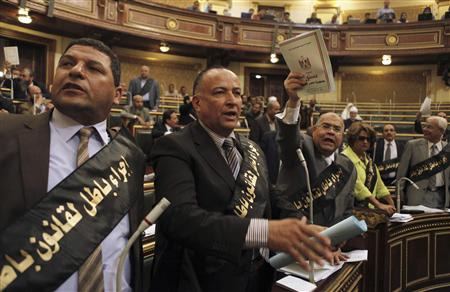
CAIRO (Reuters) - Egypt's highest court ruled on Saturday that parts of a revised election law
setting out terms for a parliamentary vote were unconstitutional,
casting fresh doubt over a poll that has already been delayed.
The Islamist-dominated upper house of parliament had approved the law last month and sent it to the Supreme Constitutional Court to check the legality of the voting procedures for a new lower house.
Opposition politicians had denounced the text of the
revised election law approved by parliament and repeated threats to
boycott the vote.The court ruled that four provisions of the bill were unconstitutional, a judicial source said.
In its decision, the court took issue with parliament's removal of a long-standing ban on religious slogans in electoral campaigning.
The ruling said that failing to include a specific clause in the law banning religious slogans could "undermine national unity." The bill will now be sent back to parliament for review.
The ruling is the
latest sign of friction between the judiciary, which Islamist lawmakers
accuse of being loyal to deposed leader Hosni Mubarak and obstructing elections and legislation, and President Mohamed Mursi's Muslim Brotherhood.
Mursi has said elections could now begin in October, completing the democratic transition from Mubarak's rule.
A separate court ruling last year dissolved the Muslim Brotherhood-led lower chamber elected in 2011-12.
Egypt has been plagued by political instability since Mubarak's ouster, scaring away investors and tourists who are needed to keep the economy afloat.
Outside parliament, baton-wielding police pushed back activists who were protesting against a controversial judicial reform law that was being discussed inside the chamber.
Parliament voted to continue discussions of the law, angering secular MPs who wore black sashes condemning it.
Islamist lawmakers allied to the Brotherhood are pushing the bill, which would force out more than 3,000 judges by lowering the retirement age.
The bill has also
angered liberal, leftist and ultra-conservative Islamist opposition
groups which accuse the Brotherhood of trying to control state
institutions rather than pressing genuine reforms. The Brotherhood denies this.
Mursi has faced a revolt against Islamist attempts to
force out thousands of judges and he has alienated some of his aides.Earlier this month, senior Egyptian judges halted talks with Mursi on judicial reforms after parliament decided to discuss the proposed laws despite presidential promises to seek consensus first.
(Reporting by Omar Fahmy; Writing by Maggie Fick; Editing by Michael Georgy and Mike Collett-White)
No comments:
Post a Comment